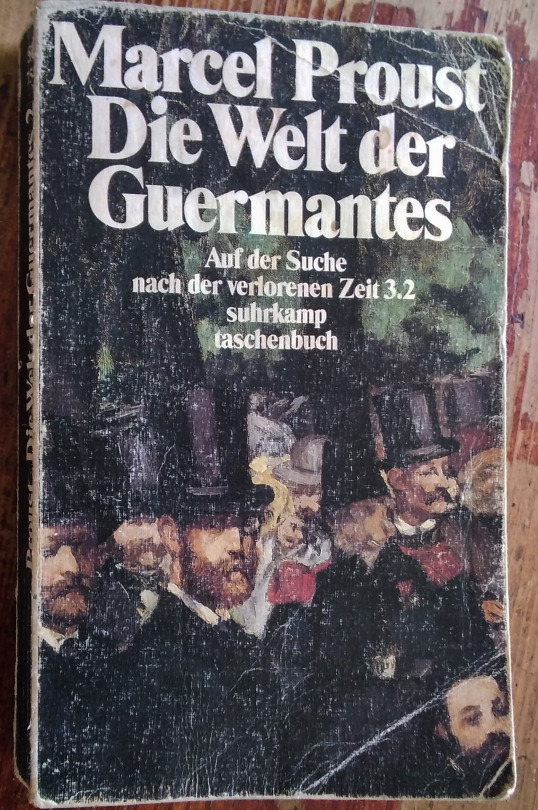#les rougon-macquart
Text
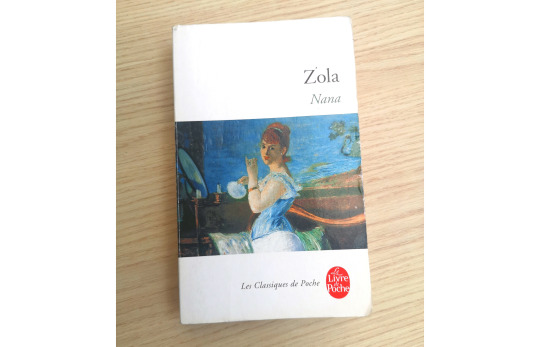
Nana, Émile Zola
Finally getting some French lit in. To be completely honest, I've had this book for almost a decade, and I never read it. Well, actually, apparently I tried at some point, because I found some underlined bits very early on -- but it's clear that I gave up. I remember struggling with it back then. I didn't, this time. It's nice to see proof of my improvement, although I'm not sure what specific skill is concerned.
For a quick & anachronistic summary, it's the story of a 19th century escort girl who makes it big in paris.
I was actually surprised by how easy to read this was. I kind of expected very difficult language. It is poetic, but not actually difficult. The text is easy to follow, almost journalistic. Poetic journalism.
I really, really enjoyed Nana. It's a long ride, and what a ride. It reads, at times, like a soap opera, with how she has a roster of desperate men orbiting around her. She really is the sun of her novel -- and it is her novel. I entered this book ignorantly (despite being French and a ~lit student, I'm not actually well-versed in my country's literature) and it kept surprising me. Where I expected a moralizing tale, or at least a pessimistic outlook on the arrogant seductress, I got the unstoppable, inescapable success of Nana. It's almost a power fantasy, although I doubt Zola saw it through this angle. I mean, it does end badly. Spoilers, but she fully dies in a disfiguring manner. And there is this underlying theme of Nana, the beautiful Venus from the lower classes, bringing the rot of the sewers to the silk sheets of the aristocracy. She all but ruins the entire upper class with the raw power of her sex-appeal, and I thought that there was something cosmic about it. By the time she's at her apex, she herself does not have control of her situation. She becomes like an empire, constantly conquering further reaches to maintain peace and prosperity throughout her imperial reign. She devours. And yet she's so incredibly human. She felt to me like a deity unaware of its power, and, in that sense, her death (especially because it's in the full bloom of her youth and legendary status) felt more like a shedding of the mortal form. Admittedly, I also just find it more fun to interpret it that way. I'm reading for fun, after all. Ah, the specter of academic seriousness hangs over me.
I think Nana is an easy entry point into that sort of literature. Yes, it's part of some long-ass series, but no, you don't need to read the previous books (I didn't). It's very self-contained. It's a long, very eventful ride, through Nana's chaotic and glamorous world. It's long but it feels like going downhill on a bike, and like everything's going too fast still. And it's fucking funny.
And for you, tumblr, my beloved, yes, you will find some messy queers in there. I only talked about Nana herself here, but Nana holds a whole ensemble cast of secondary characters, many interesting women (a wealth of them, really), that are really a whole other serving of delights that I just didn't have time to talk about here. But seriously, just about every character, especially the women, is interesting.
#i added white borders to make the bad quality more bearable but i think it somehow looks ever blurrier. blaming the tumblr post editor#nana#emile zola#émile zola#french literature#french lit#littérature#litblr#readblr#bookblr#les rougon-macquart#rougon-macquart#bones reads#chatterbones#my faves were satin (toxic) zoé (girlboss) labordette (ma fouine préférée) and actually the count (pathetic little sinner)#the last scene with all the women and their strange conversation is something i'm still pondering#in a good way#for context i think i finished it just a bit under two weeks ago#but still thinking about nana and about so many of the characters#it took me so long to mull it over enough to write this review that i had the time to finish two short reads in the meantime loollll#anyway. if it sounds intriguing to you you should read it#19th century literature
5 notes
·
View notes
Text

6 notes
·
View notes
Text

I may have the 20 volumes of the serie of books Les Rougon-Macquart by Emile Zola
So let's get started I guess!!
#books#Les Rougon-Macquart#Emile Zola#it's gonna be a long time#but it's gonna be so worth it in the end
40 notes
·
View notes
Text
Ce passage dans La faute de l'Abbé Mouret me tue de rire à chaque fois. Pascal conduit une charrette à cheval avec son neveu Serge, tout jeune abbé, à son côté :


Quand on a lu avant Pot-Bouille (un des tomes d'Octave avec Au Bonheur des Dames) c'est délicieux.
#Octave Mouret#Serge Mouret#Emile Zola#les rougon-macquart#books#littérature#la faute de l'abbé Mouret
4 notes
·
View notes
Text

die sünde des abbé mouret, émile zola, rütten & loening berlin 1982, nachwort rita schober
#la faute de l'abbé mouret#die sünde des abbé mouret#émile zola#Les Rougon-Macquart#1875#rütten & loening#berlin#1982#elisabeth eichholtz#rita schober#parsifal#obst & gemüse oder der kunde ist könig#der sichtbare mensch#future is now
1 note
·
View note
Text
24h à Béziers

View On WordPress
#Bagne de Cayenne#Béziers#canal du Midi#Casimir Péret#Cathédrale St Nazaire#Emile Zola#La fortune des Rougon#Les Rougon-Macquart#Louis-Napoléon#Pierre-Paul Riquet#Plateau des poètes#Pont-canal (Béziers)#Ryanair#Second Empire
0 notes
Text
La conquête de Plassans, Emile Zola
Le problème, l’unique problème, quand on commence à lire toute l’œuvre d’Emile Zola, c’est qu’on s’habitue à la qualité littéraire exceptionnelle de sa grande saga en vingt volume, Les Rougon-Macquart. Et ce n’est pas ce quatrième tome, La Conquête de Plassans, qui nous fera changer d’avis…
François Mouret, petit bourgeois au verbe haut, profite en toute quiétude de sa belle maison et de sa…
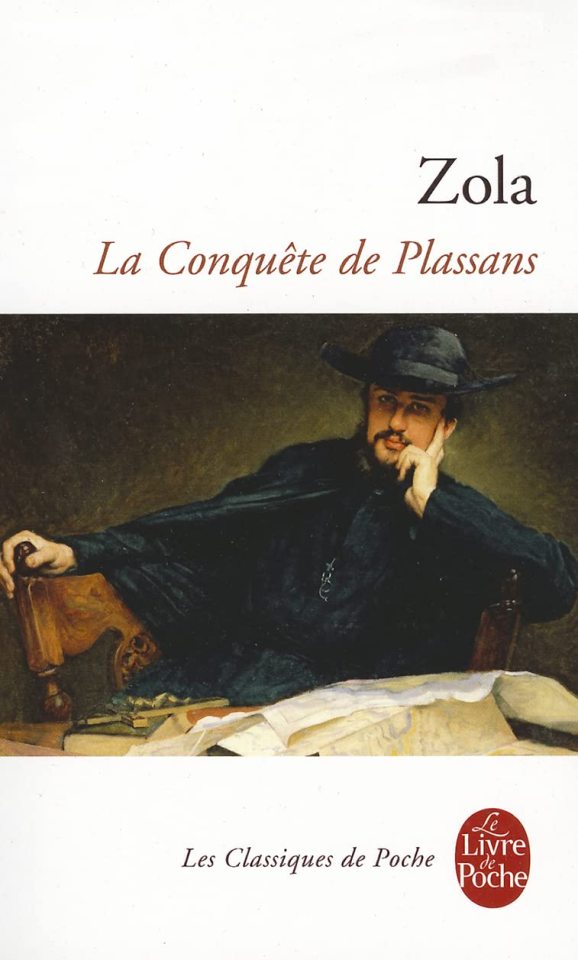
View On WordPress
#Eglise#Emile Zola#Folie#La conquête de Plassans#Le Livre de Poche#Les Rougon-Macquart#Pouvoir#Religion
1 note
·
View note
Text




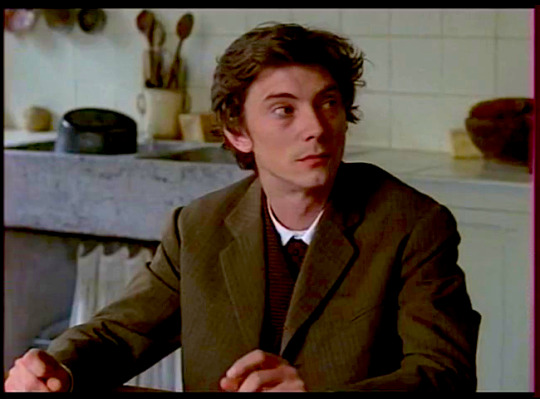


la joie de vivre (jean pierre améris, 2012)
#la joie de vivre#swann arlaud#watchlist#new motivation to start reading les rougon macquart books just dropped#this was in my drafts for so long it's time to share Him with the world
119 notes
·
View notes
Text
Les plus belles pages de la littérature : Émile Zola - Le Ventre de Paris (1873)(Les Rougon-Macquart)
Les plus belles pages de la littérature : Émile Zola – Le Ventre de Paris (1873)(Les Rougon-Macquart)
Le premier matin, lorsque Florent arriva à sept heures, il se trouva perdu, les yeux effarés, la tête cassée. Autour des neuf bancs de criée, rôdaient déjà des revendeuses tandis que les employés arrivaient avec leurs registres, et que les agents des expéditeurs, portant en sautoir des gibecières de cuir, attendaient la recette, assis sur des chaises renversées, contre les bureaux de vente. On…

View On WordPress
0 notes
Text
per esorcizzare il futuro
Quest’implacabile e oscuro inquisirmi che mi fruga dentro e fuori, mi spinge a investigarmi il cuore alla malata ricerca di potenziali violenze passate e future. Mio nonno, uomo mansueto di sconfinata bontà, invecchiato in silenzio all’ombra d’un suocero dragone e una moglie arpia, è morto dopo esser stato corroso giorno per giorno dal Parkinson, roso sin dentro le ossa, fino a diventare un altro da sé. Quando la malattia lo lasciò, non c’era più niente in lui dell’uomo che era, non ne era rimasto più nulla, come scrive Flaubert: “il l’ouvrit et ne trouva rien”. Negli ultimi tempi s’era fatto estremamente violento, quasi ferino, tirava calci a tutti, schiaffi, pugni e spinte, parole al veleno, bestemmie e imprecazioni mai udite da quella sua bocca garbata, paranoie continue per cui era convinto che il fratello s’intrufolasse in casa di nascosto per scopargli la moglie, ben corrisposto, o che gli amici sparlassero di lui al bar. E giù d’insulti e botte. Oggigiorno non se ne ricorda più nessuno e di lui, fortunatamente, è rimasto solo il ritratto d’un uomo retto e buono, come effettivamente è stato per gran parte della sua vita. Ora penso, mio nonno era un uomo buono... (intravedete già il punto del mio discorso?) la storia della mia famiglia non ha niente a che fare coi Rougon-Macquart, ma risalendo le generazioni risulta evidente una certa predisposizione alla follia. Benché la scienza mi rassicuri d’avere solo una piccola esigua possibilità d’ereditare il male, io ne sono intimamente convinto. E se mio nonno, che era un uomo buono, s’è degradato in “nu diavl” (per dirla con le urla di mia nonna), io che non lo sono, che speranza avrei di restare umano? Solo la mia assoluta integrità morale mi permette di tener docile al guinzaglio il lupo in me. Se perdessi ogni freno, cosa mi distinguerebbe da un mostro senz’anima? Diverrei pari a un lupo mannaro, il povero professor Lupin morso dalla luna piena, Harvey Keitel che si tramuta in vampiro e morde a morte l’amato figlio, un maledetto zombie in un qualsiasi film di zombie. Tanto varrebbe sopprimermi prima. Non posso perdere me stesso, non voglio perdere me stesso, la mia mente è tutto ciò che ho. Un giorno, prima di perdersi per sempre, mio nonno mi prese per un braccio, mi fissò con la disperata urgenza della fine e disse: “La cosa più importante per una persona è essere padroni di se stessi. Ricordalo!” Non l’ho dimenticato, nonno, non l’ho fatto. Non posso prometterlo, ma spero solo di poterlo ricordare per sempre.
29 notes
·
View notes
Text
“El pasado no es más que el cementerio de nuestras ilusiones”
Émile Zola
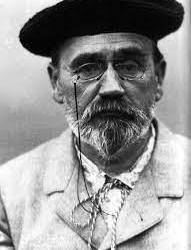
Émile Édouard Charles Antoine Zola fue un escritor francés, nacido en París en abril de 1840, y un novelista, periodista, y dramaturgo considerado el padre y el mayor representante del llamado "naturalismo literario" y un contribuyente importante al desarrollo del naturalismo teatral.
Fue hijo de un ingeniero veneciano naturalizado y de la francesa Émile Aubert.
Tras la muerte temprana del padre, se trasladó a Aix-en-Provence sufriendo penalidades económicas.
Tuvo como compañero de estudios al pintor francés posimpresionista Paul Cézanne con quien mantendría una larga y fraternal amistad y del que posteriormente por razones de personalidad terminaría.
Émile regresa a París y tras abandonar el bachillerato, decide trabajar como dependiente en una librería para evitar seguir siendo una carga para su madre en 1862.
Escribió su primer texto y colaboró en las columnas literarias de varios diarios, cultivando al mismo tiempo la amistad con personalidades como Édouard Manet, Camille Pissarro y los hermanos Gouncort escritores franceses pertenecientes a la corriente naturalista.
En 1868 concibió un proyecto denominado “Les Rougon-Macquart” y cuya aspiración era la de realizar una novela “fisiológica” en las que intentaba aplicar algunas de las teorías del filósofo, crítico e historiador Taine, uno de los principales teóricos del naturalismo, y de Claude Bernard, teórico, médico y fisiólogo francés sobre la herencia.
La obra, consta de 20 novelas y se inicia con “La fortuna de los Rougon” en 1871, el cual refleja un retrato social que siguiendo el esquema del naturalismo, contiene altas dosis de violencia y dramatismo, y demasiado explícito en sus descripciones para la época.
Entre las novelas mas destacadas de este proyecto destacan, La taberna en 1876, “Naná” en 1880, “El paraíso de las damas” en 1883, “Germinal” en 1865, “Bestia Humana” en 1890 y “El Desastre” en 1892.
También son obras clave de su escritura la trilogía “Tres ciudades” y los cuatro evangelios” en 1898 y 1902 respectivamente.
En el año de 1870, se casa con una costurera con la que no tuvo hijos. Sin embargo tuvo una amante quien le dió dos hijos.
En 1890 se rechazó su entrada en la Academia Francesa y en 1894 la Santa Sede decretó la inclusión de toda su obra en el Indice de los libros prohibidos.
Cuando Alfred Dreyfus fue acusado injustamente de espionaje a favor de Alemania, Zola surgió en defensa del militar judío escribiendo el famoso artículo “Yo, acuso” el cual fue publicado el 13 de enero de 1898 y que sirvió para que se reabriera el caso judicial.
La publicación de este artículo le llevó a prisión durante un año, huyendo el autor francés a Inglaterra. Finalmente, tanto Zola como Dreyfus fueron declarados inocentes
Émile Zola falleció en París el 29 de septiembre de 1902, a causa de una intoxicación provocada por la inhalación de gases provenientes de una chimenea a la edad de 62 años.
Fuentes: Wikipedia, alohacriticon.com, biografiasyvidas.com
#emile zola#francia#escritores#citas de escritores#citas de reflexion#naturalismo#activistas#novelistas#frases de novelistas#frases de escritores
32 notes
·
View notes
Text
The Death of Albine
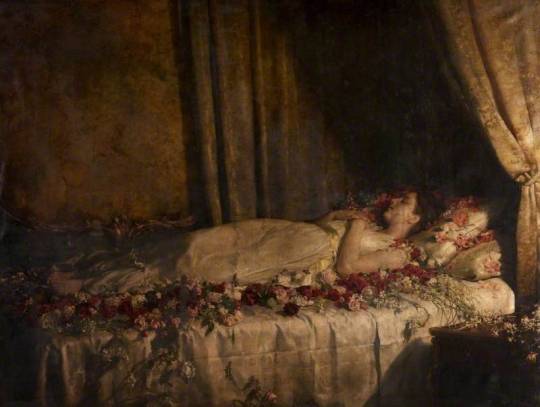
This painting is based on the tragic climax of Émile Zola's 1874 anti-clerical novel 'The Sin of Father Mouret', the fifth novel in the author’s twenty-volume series 'Les Rougon-Macquart'. Set in a small provincial town, Albine, its female protagonist, is an uneducated and fanciful young girl who falls in love with the neurotic Father Mouret. Suffering from amnesia, he consummates a passionate romance with her, but when his memory returns is wracked by guilt and abandons her.
"And I often find myself thinking that happiness is fatal and fleeting so why must I dare to have a moment of glee when the coming day I'll have to drown myself in a sea of sorrow"
#victorian era#victorian aesthetic#1800s art#19th century#dark academia#spilled thoughts#writers block#spilled words#writers on tumblr#spilled ink#writers and poets#authors#1800s#oil painting#john collier#love#tw death#trauma#light academia#light aesthetic#quote blog#writerscommunity#writeblr#spilled writing
5 notes
·
View notes
Text
« La bourgeoisie progressiste – ces nouveaux Rougon-Macquart déguisés en hipsters – n’achète plus d’hôtels particuliers dans le XVIe arrondissement, mais des lofts à un million d’euros à Montreuil. Cette bourgeoisie a ceci de particulier qu’elle maîtrise parfaitement les codes culturels et médiatiques de la société multiculturelle actuelle, qu’elle est en phase avec le narratif dominant, celui de Netflix, pour aller vite. Elle n’est pas guindée comme l’ancienne bourgeoisie conservatrice. Elle est dans le cool et la “positive attitude”, pour reprendre l’emphase communicationnelle des entreprises multinationales. Comme nous l’avons vu, cette bourgeoisie écolo se soucie beaucoup de l’empreinte carbone (des salauds de pauvres qui polluent). Mais quid de sa propre “empreinte sociale” ? Notez que je cible beaucoup cette bourgeoisie parce que je pense qu’elle est la garantie de survie du modèle néolibéral – c’est cette bourgeoisie-là, ce gros 20%, qui, alliée aux retraités, arrive à faire une majorité électorale macroniste. »
Christophe Guilluy
9 notes
·
View notes
Text

Léon Choubrac - Advertisement for the serialization of "Germinal" by Emile Zola in the magazine "Gil Blas" on 25 November 1884.
Émile Édouard Charles Antoine Zola (; 2 April 1840 – 29 September 1902) was a French novelist, journalist, playwright, political activist, the best-known practitioner of the literary school of naturalism, and an important contributor to the development of theatrical naturalism. He was a major figure in the political liberalization of France and in the exoneration of the falsely accused and convicted army officer Alfred Dreyfus, which is encapsulated in his renowned newspaper opinion headlined J'Accuse…! Zola was nominated for the first and second Nobel Prize in Literature in 1901 and 1902.
Germinal is the thirteenth novel in Émile Zola's twenty-volume series Les Rougon-Macquart. Often considered Zola's masterpiece and one of the most significant novels in the French tradition, the novel – an uncompromisingly harsh and realistic story of a coalminers' strike in northern France in the 1860s – has been published and translated in over one hundred countries. It has also inspired five film adaptations and two television productions.
Germinal was written between April 1884 and January 1885. It was first serialized between November 1884 and February 1885 in the periodical Gil Blas, then in March 1885 published as a book.
The title refers to the name of a month of the French Republican Calendar, a spring month. Germen is a Latin word which means "seed"; the novel describes the hope for a better future that seeds amongst the miners. As the final lines of the novel read:
Des hommes poussaient, une armée noire, vengeresse, qui germait lentement dans les sillons, grandissant pour les récoltes du siècle futur, et dont la germination allait faire bientôt éclater la terre.
Men were springing forth, a black avenging army, germinating slowly in the furrows, growing towards the harvests of the next century, and their germination would soon overturn the earth. — 1885 translation[
Gil Blas (or Le Gil Blas) was a Parisian literary periodical named for Alain-René Lesage's novel Gil Blas. It was founded by the sculptor Augustin-Alexandre Dumont in November 1879.
Gil Blas serialized novels, such as Émile Zola's Germinal (1884) and L'Œuvre (1885), before they appeared in book form. Numerous Guy de Maupassant short stories debuted in Gil Blas. The journal was also known for its opinionated arts and theatre criticism. Contributors included René Blum, Alexandru Bogdan-Pitești, and Abel Hermant. Théophile Steinlen and Albert Guillaume provided illustrations.
Gil Blas was published regularly until 1914, when there was a short hiatus due to the outbreak of World War I. Afterwards, it was published intermittently until 1938.
In addition to Germinal, Gil Blas serialized the Zola novels L'Argent, Au Bonheur des Dames, and La Joie de vivre.
Gil Blas critic Louis Vauxcelles's phrase "Donatello chez les fauves" ("Donatello among the wild beasts") brought notoriety and attention to the works of Henri Matisse and Les Fauves exhibited at the Salon d'Automne of 1905. Vauxcelles' comment was printed on 17 October 1905[4] and passed into popular usage.
6 notes
·
View notes
Text
À deux doigts de lancer une série de posts aesthetic sur les Rougon Macquart d'Emile Zola !!!



#upthebaguette#les rougon macquart#emile zola#books#littérature#nana#germinal#au bonheur des dames#la faute de l'abbé mouret#l'assomoir : des verres vides et un lavoir xD
17 notes
·
View notes

